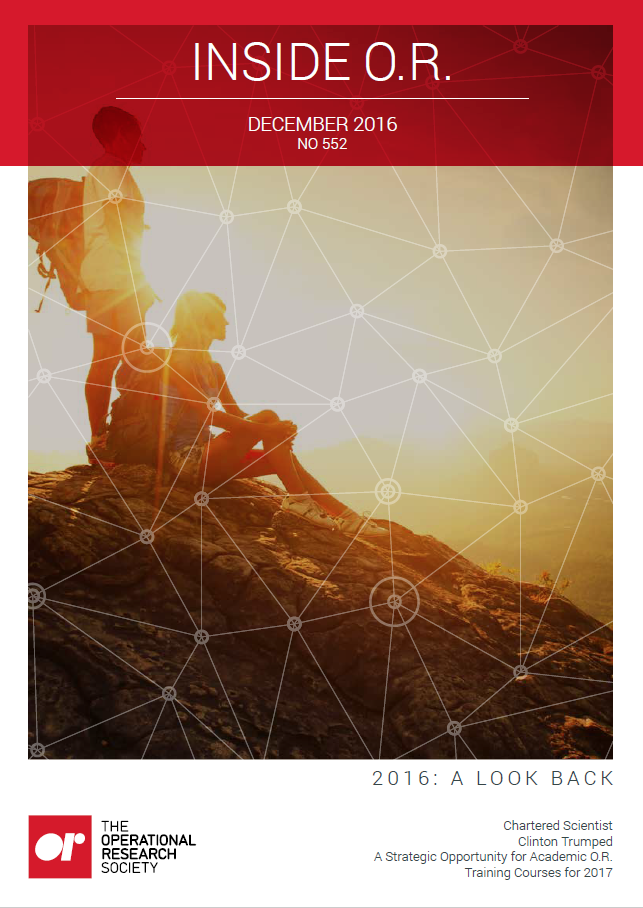This month, Vice President Sanja Petrovic writes about the benefits of using games in the teaching of OR; John Crocker covers the election of Donald Trump to the office of US President; John Ranyard responds to Gillian Groom's letter ‘What is OR?’; and The OR Society announces it can offer Chartered Scientist status (via a Science Council licence) to augment our accreditation and career development offering.
Games in OR Education
SANJA PETROVIC, VICE PRESIDENT OF THE OR SOCIETY
Not long time ago, a blackboard and chalk served as a main means of teaching. Then came the whiteboard accompanied by “vufoils” and projectors followed by the dreaded Powerpoint slides which allowed lecturers to prepare their material. They also allow for animations to bring some dynamics into slides. However, providing education gets more and more characteristic of the service industry which implies that students become and are treated as customers (although personally I am not fond of this statement for a variety of reasons, which are outside the scope of this text). Apart from equipping students with knowledge it is expected that learning is an enjoyable process infused with fun. How better to do that than through games?
Gottfried Wilhelm Leibniz (1646-1716), a famous mathematician and philosopher, praised games saying that “Human beings are never more ingenious than in the invention of games”. We can put his clever thoughts in the context of OR. One of the best know games used in teaching supply chain management is the “Beer Game”, which was invented by Jay Forrester at MIT in the 1960s as a result of his work on system dynamics. This game does not require the use of computers but there is a software version. The Beer Game simulates a four stage supply chain, namely it introduces a retailer, wholesaler, distributor and factory. Each stage is played by one or preferably more students. The factory/brewery produces beer. This goes through the distributors to the wholesalers who then satisfy the orders placed by the retailers and reaches the customer at the downstream end of the chain. In each of the four stages (correspond to groups of students), incoming orders of beer have to be fulfilled by placing orders with the next upstream stage.
This serves excellently in teaching students typical supply chain issues such as the bullwhip effect, the benefits of information sharing, supply chain management, etc. A range of different versions of the Beer Game have been developed over the years, which tells enough about its popularity.
In the era of digital revolution, when many of our activities are supported by computers, smart phones and other mobile devices, it is to be expected that education and teaching methodologies are updated to follow the needs and also the expectations of the modern world. There is no doubt that there are many benefits of using game-based learning in many disciplines including OR. An element of fun in teaching increases the attention of students, their motivation and retention. Well-designed games can help students to apply what they learn
in a classroom to a simulated real-world decision making problem. While “playing” they can also experience strategies of different risk levels, which would be risky to experiment with in real-world. It is in human nature to have a desire to win. In order to win, students must learn and understand the OR concepts involved in the game.
There are a number of companies which develop software for game-based learning of OR and OR-related subjects. Here is what some of them they say:
GameLab, From Classroom to play ground: “When we are playing our brain gets into a state know as Flow, which is a state of full immersion in an activity. This state triggers the engagement and motivation, and in consequence it enhances learning.”
The Fresh Connection: “To learn through experience, is 10 times more powerful than a classical training.”
Marketplace Live: “Business simulations allow students to experiment with business strategies, test business ideas, and experience the consequences of their actions in a virtual business environment. As students apply the theoretical knowledge they learned in your class to make strategic and tactical business decisions in the game, they develop skills critical to succeed in today’s business world.”
INFORMS: Transactions on Education dedicated a whole issue on the use of classroom games in Management Science and Operations Research which was published in 2007.
I believe that game-based learning will become more and more popular. New knowledge and skills will be required to develop challenging, educational and at the same time entertaining games to learn OR concepts.



